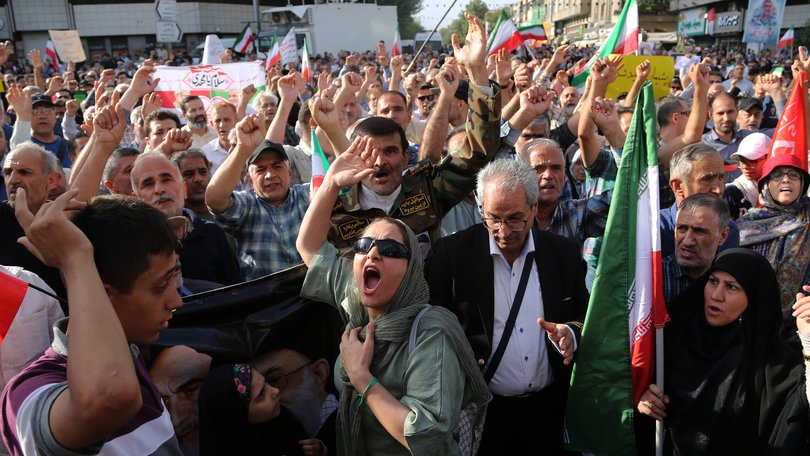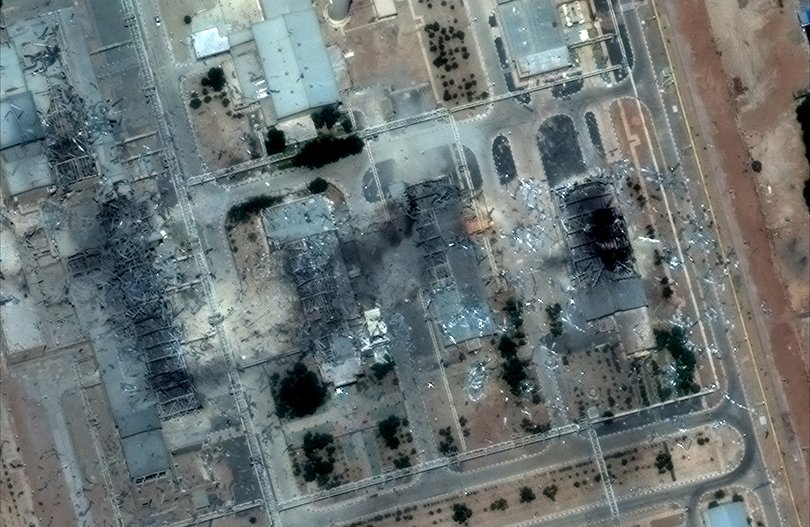Middle East crisis: Anthony Albanese backs Trump’s strikes on Iran nuclear sites but reiterates de-escalation
Mr Albanese refused to say whether Australia had received advance notice like the United Kingdom had, saying Australia was ‘not a central player in this conflict’.

Anthony Albanese has backed the United States’ “successful” strikes on Iranian nuclear facilities but reiterated calls for de-escalation, as Tehran vowed to respond and Donald Trump left the door open to enforcing regime change.
More than 24 hours after American bombs struck three nuclear sites in Iran, the Prime Minister labelled the USA’s actions as “unilateral” but critical to ensuring Iran could not build nuclear weapons.
“The world has long agreed that Iran cannot be allowed to get a nuclear weapon, and we support action to prevent that – that is what this is,” the Prime Minister said, in a more unequivocal statement than that issued by an unnamed government spokesperson on Sunday that had called for peace and adopted a neutral stance on the attack.
Sign up to The Nightly's newsletters.
Get the first look at the digital newspaper, curated daily stories and breaking headlines delivered to your inbox.
By continuing you agree to our Terms and Privacy Policy.Speaking after convening the National Security Committee on Monday, Mr Albanese refused to say whether Australia had received advance notice like the United Kingdom had, saying Australia was “not a central player in this conflict”.
“This was unilateral action taken by the United States,” he said.
Mr Albanese indicated no Australian resources or support had gone towards the attacks on the Fordow, Natanz and Isfahan sites, but refused to say whether the Pine Gap communications facility had been used.
He reiterated calls for de-escalation and for Iran to return to the negotiating table.
“We are deeply concerned about any escalation in the region, and we want to see diplomacy, dialogue and de-escalation,” he said.
“Iran didn’t come to the table, just as it has repeatedly failed to comply with its international obligations. We urge Iran not to take any further action that could destabilise the region.”
He would not be drawn on whether his Government had seen intelligence proving Iran was on the cusp of developing a nuclear weapon, saying only “the information has been clear that Iran has sought to increase the grade, which had been, you know – there’s no other explanation for it to reach 60 other than engaging in a program that wasn’t about civilian nuclear power. And that was clear”.
“Had Iran complied with the very reasonable requests that were made, including by the IAEA, then circumstances would have been different,” he said.

The Coalition welcomed the Government’s support of the US’ actions, but shadow home affairs minister Andrew Hastie said the Prime Minister had been “too slow, too silent and too passive”.
Divisions within the Labor party emerged on Monday, with the Labor Against War group declaring: “We cannot be dragged into another US-led war in the Middle East built on lies and half-truths”.
Questions about whether the US’ actions were in accordance with international law have swirled in the aftermath of the attack, and Foreign Minister Penny Wong did not directly respond on Monday morning when asked.
“The world has long agreed that Iran is not in compliance with its international obligations when it comes to nuclear material. And the world has long agreed that it is not in the interest of collective peace and security for Iran to gain access to any nuclear weapon,” she told ABC News.
Iran has long insisted its nuclear program is solely for civilian purposes, and the UN’s International Atomic Energy Agency has also rejected Israel’s claims that Tehran was on the verge of making nuclear weapons.
Greens senator David Shoebridge said the world “should be guided by” the non-partisan international body, and said the US’ attacks were a breach of international law.
“You would have thought a country like Australia which is repeatedly saying it believes in an international rule-based order would be able to have our Foreign Minister, and say clearly whether or not she thought these attacks were breach of international law,” he said.
“Every credible international lawyer says they were but there is this evasion by Penny Wong and Anthony Albanese and that is because they know these were unlawful attacks.”
While President Trump said the strikes had “obliterated” the three sites, Iran has yet to reveal the extent of the damage caused to its nuclear facilities, and the IAEA has said the real damage to Fordow, which is located deeply underground, remains unknown.
President Trump said the strikes had “obliterated” the three sites, dismissing Iranian attempts to downplay the damage from the weekend’s strikes.
Iran’s Foreign Minister Abbas Aragchi, who travelled to Moscow to meet with Vladimir Putin on Monday, had earlier called America’s actions “unforgivable”, warning there would be “everlasting consequences”.
Supreme Leader Ayatollah Ali Khamenei meanwhile vowed the “punishment will continue” against the “Zionist enemy”.
At an emergency meeting of the United Nations Security Council on Sunday, Iran’s ambassador Amir Saeid Iravani said the US had “decided to destroy diplomacy”, warning Iran will “take all measures necessary”.
The Ambassador also raised questions about the US’ actions against Iran, saying they were “a clear and flagrant breach of international law”.
At the same meeting, UN Secretary General Antonio Guterres warned the conflict risked “descending into a rathole of retaliation”.

Mr Trump on Sunday, local time, said any retaliation by Iran against the US “will be met with force far greater than what was witnessed tonight”.
Iran said that constituted “bullying on a global scale”.
The US President has also kept the door ajar to regime change, contradicting claims made by his Vice President and Secretary of State who had earlier said the US’ activities were not about forcing such change.
In a post on Truth Social, Mr Trump wrote: “It’s not politically correct to use the term, “Regime Change,” but if the current Iranian Regime is unable to MAKE IRAN GREAT AGAIN, why wouldn’t there be a Regime change??? MIGA!!!”
Mr Hastie said the West “have to be really careful about what we wish for” when it comes to regime change.
“I think it is sometimes better the devil you know, as repressive as this regime is, as terrible as it is, as much as it persecutes a lot of minorities, we would see a mass migration of people out of Iran that would pose big questions for Europe and you never know who’s going to follow into the power vacuum and take control of the country,” he told ABC News.
“These are really important questions policymakers need to be thinking through. If there was a regime change I hope it would be done with as much order as the Iranian people could and would be done by them, not by an external power.”
With more than 40,000 American troops on bases and warships in the Middle East, the US is now on high alert for retaliation.
The United Kingdom is also alive to the possibility of its bases being targeted by drone strikes, British press reported.
Fears of reprisal against diplomats and staff also prompted the Albanese Government’s decision to evacuate its embassy stuff from Tehran last week, Senator Wong indicated on Monday.
There are also fears the crisis could spill over beyond the region, with reports out of the US claiming Iran had warned President Trump while he was at the G7 summit in Canada last week that if Washington entered the conflict, sleeper cells inside the US would be activated.
The escalating crisis is also set to have a devastating global economic effect, after Iran’s parliament reportedly approved to close the Strait of Hormuz, one of the world’s most important shipping routes, and is now subject to the Supreme National Security Council.
Oil prices have surged following the US attack, and any state-sanctioned blockade could send them skyrocketing.
US Secretary of State Marco Rubio on Sunday, US time, called on China - who heavily depends on the passage for their oil supply - to prevent Iran from closing the strait.
“If they (close the Straits) ... it will be economic suicide for them. And we retain options to deal with that, but other countries should be looking at that as well. It would hurt other countries’ economies a lot worse than ours,” he told Fox News.
As the world waits for Iran’s next moves, the tit-for-tat strikes between Iran and Israel continued on Monday for the eleventh day. Israel’s military said it had launched a “wave of strikes against military targets”, including airports, in western Iran and the capital Tehran overnight into Monday.
A military spokesperson said it had destroyed 15 fighter jets and helicopters.
“The strikes damaged runways, underground apartments, a refuelling plane, and F-14, F-5, and AH-1 aircraft belonging to the Iranian regime,” the IDF spokesperson said in a statement.
Meanwhile, Iran launched its own strike on Israel on Monday - firing a missile intercepted by Israel’s air defences, the IDF said.
Reports also emerged on Monday that Iran had executed a man found guilty of spying for Israel.
According to AFP, the Iranian judiciary said the man had been hanged “for intelligence cooperation with the Zionist regime”. The man was also alleged to have collaborated with a London-based Persian TV channel critical of the Iranian Government, which Tehran considers to be linked to Israel.
With no sign of the conflict letting up soon, the Australian Government is continuing to recommend to the 2900 Australians registered as being in Iran and 1300 in Israel to leave if it is safe to do so.
The Government moved military planes and personnel to the region late last week as a contingency, to be ready if and when the airspace re-opens.
There was hope on Monday morning, local time, that the Israeli airspace would open briefly in coming hours for some outgoing flights from Tel Aviv.

